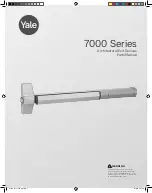
17
16
Stick Welding (MMAW)
Connection for Stick Welding
It is important to select the electrode
polarity in accordance with the
manufacturers recommendations for that
electrode. Most common electrodes,
including cellulose types, are operated with
the electrode at positive polarity.
Stick Welding Operation
Be certain that you are wearing suitable
protective clothing, gloves etc and that
you are working in a non-hazardous area. If
necessary, refer again to Section 1 - Safe
Practices in this manual.
Connect the work clamp to the work piece.
Place the desired electrode in the electrode
holder (electrode holder optional extra).
Turn on the power switch located on the rear
panel. Wait approximately 5 seconds as the
unit goes through its initiation sequence.
Press the Weld Process button until the
Stick Process light is on.
Select an appropriate welding current for
the electrode diameter by setting the knob
on the machine front panel. WIA Austarc
electrodes will give the best results.
To strike the arc, drag the end of the
electrode along the work piece as if
striking a match. As the arc initiates, lift the
electrode slightly away, aiming to establish
an arc length of approximately 3 mm.
As the electrode end is consumed, feed the
electrode into the arc in order to maintain
arc length. As a general rule, the arc
should be held as short as possible while
still giving stable burn off and good weld
appearance. An arc which is too long cause
an unwieldy flow of metal with a rough weld
appearance and reduced penetration.
An arc too short leads to a narrow weld
deposit and “stuttery” arc characteristics,
and the electrode is liable to freeze onto
the work piece.
As the solidified weld deposit forms, move
the end of the electrode slowly along
the weld path, aiming to maintain a pool
of moulten weld metal behind the arc.
Decreasing this rate of travel will result in a
wider weld deposit, and similarly increasing
it will narrow the weld deposit.
Always fill the crater which tends to form
at the end of a weld deposit, by pausing
momentarily before withdrawing the
electrode to break the arc. Unfilled craters
are a point of weakness, and can lead to
weld cracking.
Current Range for General Purpose
Electrodes
Diameter (mm) Current (Amps)
2.0
40 - 60
2.5
60 - 85
3.2
90 - 130
4.0
130 - 180
Summary of Contents for CP144-1
Page 35: ...35 NOTES ...
















































